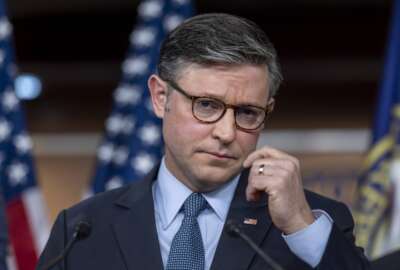Obama transition learns from the past
Common mistakes hope to be avoided by setting tone early
By Jason Miller
Executive Editor
FederalNewsRadio
President George Bush and President-elect Barack Obama’s meeting Monday was one of the earliest between a sitting president and a president-elect in recent memory.
It also is a sign of just how committed the outgoing and incoming administrations are to making the change go smoothly, says Martha Kumar, director of the White House Transition project, a non-profit think tank that offers advice about presidential transitions.
“The earlier transition is less about the current government and more about the commitment to the people coming in,” Kumar said recently at a panel discussion in Washington sponsored by the Council for Excellence in Government.
“This administration has made the commitment to this transition that has not been made previously.”
And that commitment along with the Obama transition team’s experience from previous administration bodes well for the transfer of power, experts say.
Harrison Wellford, a member of the Obama transition group, says there is no sign of infighting and there has been remarkable teamwork and discipline among the Obama team.
That discipline, he says, starts with the chief of staff. President-elect Obama named Congressman Rahm Emanuel (D-Ill.) as his chief of staff last week.
“The most important thing is to get certain critical appointments in place,” Wellford says. “If you don’t, then problems begin to develop.”
Wellford says the chief of staff, White House general counsel and the director of White House personnel are the top three positions that need to be named initially.
“It seems obvious, but others have screwed it up,” he says.
“The people that will create the discipline for choosing rest of White House team and have a role in vetting rest of cabinet members. That was not the case with Clinton. He didn’t appoint chief of staff until after Christmas. He suffered from that because vetting discipline wasn’t there.”
Wellford says the Obama transition already has many of these disciplines.
“It starts with the emphasis of the President-elect,” he says.
“The Obama campaign is famous for its discipline. There were no leaks. The hard decisions were made early and huge benefit was paid to the campaign because of that. The discipline is communicated to the chief of staff and then percolates to rest of White House. I expect a tight ship will be run by the Obama White House.”
Wellford says the media and White House scholars will measure transition team’s progress.
He says the new administration will set their own benchmarks for success.
“We will communicate what we want to get done over the next 177 days,” he says. “Our emphasis is on transparency.”
One metric will be teamwork, especially with the career federal service.
Wellford says the Obama teams believes past transitions did not rely on the career employees like they should have.
“You will see a new attitude when the transition team comes into federal agencies,” he says.
“I think you will have very experienced people at top levels in this administration and many of those people have served in government before. They appreciate the value of career service.”
Kumar says other benchmarks may include how many people have been confirmed after the first 100 days, how many executive orders the administration issued and how many pieces of legislation has been submitted to Congress.
Wellford adds that the Obama team also initially will focus on two or three core issues such as healthcare, the war on terror and the economy. And how well they do in affecting change in these areas also will be among their benchmarks of success.
—
On the Web:
Office of the President-elect – Web site
(Copyright 2008 by FederalNewsRadio.com. All Rights Reserved.)
Copyright © 2025 Federal News Network. All rights reserved. This website is not intended for users located within the European Economic Area.





